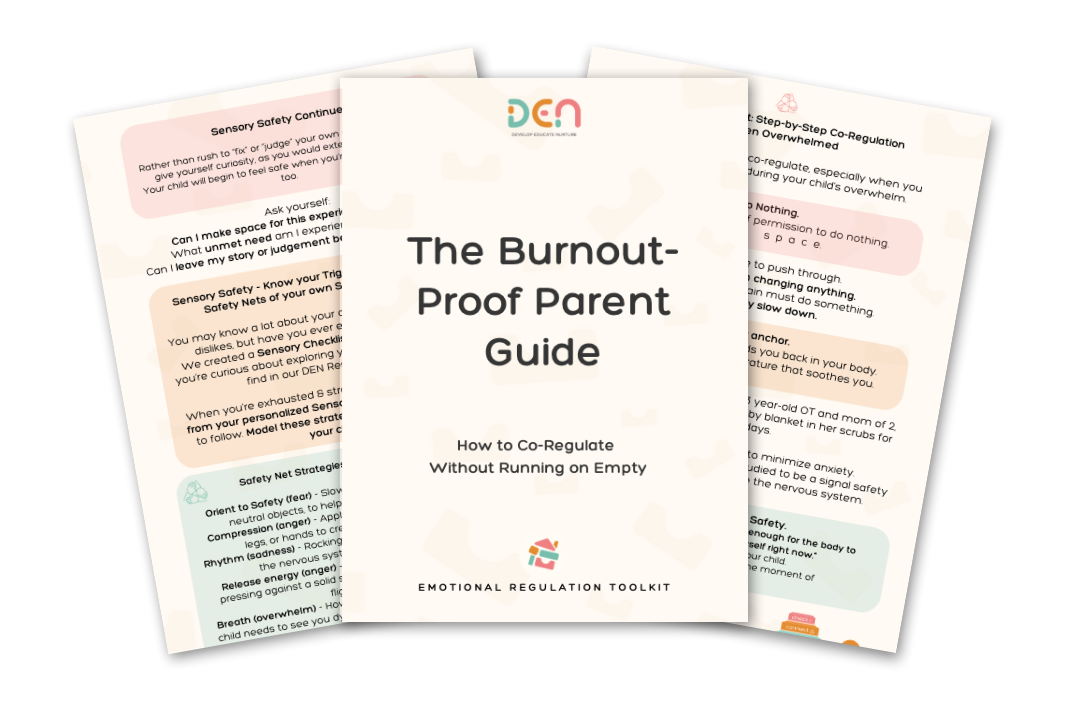Parent Burnout: Signs, Symptoms, & Nervous System Support
Parent Burnout: Signs, Symptoms, & Nervous System Support
Nervous System Regulation Tips for Parents
Parent Burnout Explained: Here Are the Highlights
You’re probably juggling a lot right now. Here’s the gist of what’s inside:
- Why your nervous system regulation matters when you feel overwhelmed as a parent
- How to recognize signs of parent burnout & capacity limits before you spiral
- Quick in-the-moment emotional regulation strategies that reduce sensory overload, build capacity, & model regulation for your child

The Invisible Mental Load of Summer: A Parent’s Perspective
It’s late afternoon. Everyone’s hot, overstimulated, and arguing about snacks.
The kids are melting down. You’re out of groceries. The house is loud. Your head hurts. The laundry buzzer sounds because it obnoxiously needs you to know IT NEEDS YOU TOO.
You either snap with big trash bag energy—“If these toys aren’t cleaned up in ONE minute, they’re gone!”—or maybe you freeze on the kitchen floor, eyes glazed over, unsure what to do next.
This isn’t about your parenting skills.
This is your nervous system saying, “I’m done.”
You’re not failing. You’re over capacity.
Parent Nervous System Regulation: Understanding Your Own Needs
You know the way your child’s behavior feels overwhelming to them? That’s real.
What’s also real is your own threshold—the amount of stress, noise, demand, and unpredictability your body can hold before tipping into overload.
Any of these adult triggers resonate? 😬
Clutter or constant background noise
Being touched repeatedly without breaks
Driving in traffic while everyone talks at once
Watching the clock while running behind
Hunger, heat, overstimulation, fatigue
The mental noise of unprocessed thoughts or unfinished tasks
Feeling pulled in 5+ directions at once, completing tiny parts of multiple tasks but never finishing anything.

“Being overwhelmed by the world around you doesn’t make you a bad parent. It makes you a human with a body.”
Awareness in Parenting is the First Step in Nervous System Regulation
Your nervous system responds to stress in predictable patterns. Recognizing these stress patterns can help you intervene early or respond with more care afterward.
Do any of these responses feel familiar?
Fight, Flight, Freeze, & Fawn: Common Stress Responses in Parenting
- Fight
- Noticing signs of irritability, snapping, tight muscles, and/or clenched jaw?
- Can be misread as "angry" or "overreactive"
- Root: Feeling powerless or unheard
- Flight
- Noticing signs of restlessness, overplanning, multitasking?
- Can be misread as "productive"
- Root: Underlying panic, "Slowing down doesn't feel safe"
- Fawn
- Noticing people-pleasing and over-apologizing?
- Can be misread as "kind" or "the go-to person to ask"
- Root: Fear that conflict means danger. A belief that keeping others happy keeps you safe.
- Freeze
- Noticing zoning out, feeling stuck, doom strolling
- Can be misread as "lazy"
- Root: Belief that your needs won't be met, so why even try.
Recognizing that these choices are a patterned response is the first step in supporting your nervous system with grounding questions:
“What am I feeling in my body right now?”
“Would it help to
move,
breathe, drink
water, or
name this feeling?”
“Do I need
support,
space, or
something else?”
Capacity in Parenting & Nervous System Limits
Calm isn't the goal - capacity is!
Calm is a fluctuating state, not necessarily a goal. It’s how your nervous system can feel in one moment, but it's not a constant.
Capacity is a threshold. It's a window that gets bigger and smaller depending on how much sensory input and demand your mind and body are influenced by.
It’s shaped by so many things: sleep, stress, sensory aversions and preferences, trauma history, life demands, health, and environment.
You don’t need to “stay calm.”
You just need to notice when you’re getting close to your edge.
Practice phrase: “I’m starting to get tight in my chest. I need a pause before we keep going.”

Quick Nervous System Regulation Strategies for Busy Parents
You don’t need a 90-minute break, a weekend alone, or a night out (though any of those would be nice!). You just need a moment. When you feel the edge creeping close, try one of these strategies:
Palms flat on a
cool surface (like the fridge)
Press your back against a wall for
deep pressure
Sway gently,
step outside, or
stretch
Close your eyes and
press your tongue to the roof of your mouth
Whisper, “I’m allowed to slow down.”
Even a 15-second pause can shift your internal state.
What to Do After You’ve Lost It: Parent Recovery & Repair
Supporting Your Own Nervous System in the Repair Process
Let’s be real: Sometimes you don’t catch it in time.
The child is already crying. You’ve already raised your voice. You’re both dysregulated.
Now? You repair.
You step back. You breathe. It's okay (and encouraged) to say to your child,
“I was overwhelmed, and I didn’t show up how I wanted to. I’m here now.”
This is co-regulation, not perfection. And the difference it makes?
When we model repair for our kids, this becomes their inner world for emotional regulation in the future.
You are teaching your child that grownups lose it sometimes and also take responsibility.
You are showing them that emotional regulation isn’t about avoiding big emotions; it’s about returning to connection afterward.
If you’re still here reading just pause for a second. You’re already doing the work.
The
noticing. The
learning. The
caring deeply. That matters more than anything you get “right.”
When you care for
your nervous system, the entire environment shifts, even if nothing else changes.
Want the next step of support with this?
We have put together a guide just for you 👇🏽
Inside the guide, you’ll learn how to:
- Recognize your nervous system state in real time
- Co-regulate with your child without powering through exhaustion
- Respond to big moments without burning out
Looking for community to practice with? And experts to guide you along the way?
You don’t have to figure this out alone.
Inside the DEN Parent Hub community, you’ll find education, real talk, and nervous system tools grounded in co-regulation and compassion.
No shame. No judgement. Just real support.
Was there a moment in this post that made you feel seen? We’d love to hear and share that with you.
Drop your thoughts below. Your comment might be the exact thing another parent needs to hear today.

Hello! We’re Vanessa & Tina.
Parenting coaches for neurodivergent children, your parenting problem-solving besties!
The Burnout Proof Parent Guide





